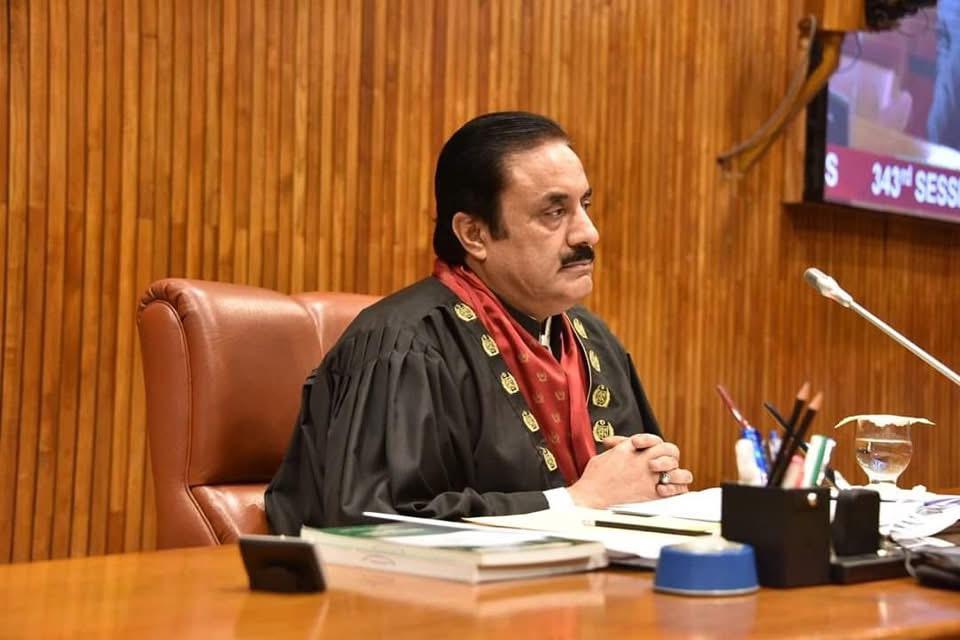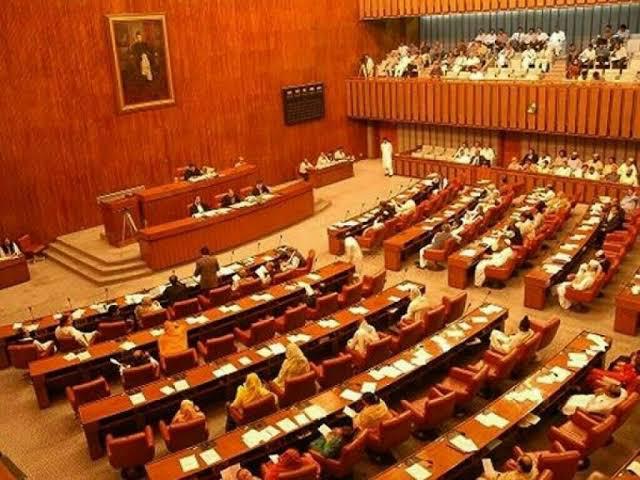By. Muhammad Irfan Siddiqui
– A significant development took place in Pakistan’s upper house of Parliament, the Senate, when Deputy Chairman Syedal Khan, presiding over today’s session, issued a strong and clear ruling aimed at restoring discipline and decorum within the House. While chairing the session, Deputy Chairman Syedal Khan drew the attention of all members to Rule 225, Paragraph 7, which explicitly prohibits any form of slogan-chanting, waving of banners or flags, or displaying images during Senate proceedings.

The Deputy Chairman emphasized that the Senate is not just any legislative forum—it represents all federating units of the country. Its sanctity and decorum must be upheld at all costs. He stated, “This House reflects the voice of all provinces and regions, and it is our constitutional responsibility to safeguard the rules and dignity of this august institution.”
In his ruling, he addressed the House firmly yet respectfully, stating that he expects all honorable senators to act in accordance with the Senate rules and regulations. “I urge and hope that every member will uphold the sanctity of this chamber by adhering to the rules. The Senate is not a place for political showmanship but a forum of serious legislative discourse,” he added.
He went further to call upon all parliamentary party leaders to educate and inform their members about the relevant rules. Syedal Khan issued a stern warning that, moving forward, any violation of these rules will result in disciplinary action under Rules 13(4) and 246. “I have no favorites; all members are equal in my eyes—there is no VIP here. However, the House will operate strictly in accordance with the rules,” he affirmed.

Commitment to a Rule-Based Senate
This statement by the Deputy Chairman is being viewed as a positive and necessary step toward maintaining the legislative and ethical standards of the Senate. Over the past few months, there have been increasing concerns about the decorum of parliamentary sessions being disrupted by unruly behavior, sloganeering, and the use of props, banners, and visuals that often divert attention from substantive discussions.
By reinforcing the rules and calling for unity under a shared parliamentary framework, Deputy Chairman Syedal Khan has sent a strong message: the Senate must reflect seriousness, civility, and professionalism. His commitment to upholding neutrality, transparency, and the institutional authority of the Senate has earned praise from parliamentary experts and civil society organizations alike.
Positive Initiatives by Deputy Chairman Syedal Khan
Beyond this specific ruling, Deputy Chairman Syedal Khan has consistently taken steps to strengthen the role and effectiveness of the Senate. Since assuming office, he has advocated for greater accountability, digital transparency in voting, and increased engagement between Senate committees and public stakeholders.
Earlier this year, he launched a “Senate Outreach Initiative” aimed at bringing the upper house closer to citizens by holding public forums and youth dialogues in universities across Pakistan. This program has already been implemented in several provinces and has received widespread appreciation for bridging the gap between lawmakers and the younger generation.
In terms of legislative productivity, Deputy Chairman Khan has been instrumental in ensuring that key bills are deliberated upon in depth and not rushed through without scrutiny. His support for bipartisan collaboration on issues such as electoral reforms, fiscal decentralization, and health legislation has helped create a more functional and respectful parliamentary environment.
He has also been a strong advocate for digital modernization of Senate records and proceedings, pushing for live streaming of sessions, accessible archives, and digital attendance systems—all of which are in line with international best practices for legislative transparency.

A Message of Unity and Integrity
The Deputy Chairman’s speech on June 18 was not just a reminder of the rules; it was a broader call for unity and institutional integrity. His assertion that “no one is special and no one is ordinary” echoes a core democratic principle—that all public representatives are equal under the law and accountable to the same standards.
His appeal to parliamentary party leaders to take ownership and responsibility for guiding their members is particularly timely. As Pakistan navigates complex political and economic challenges, a disciplined, rule-bound Senate can provide the kind of legislative leadership and stability that the country needs.
In conclusion, Deputy Chairman Syedal Khan’s firm but balanced approach to governance within the Senate stands as a model of responsible leadership. His recent ruling, coupled with his broader reformist vision, signals a new chapter for the upper house—one defined by dignity, respect for the constitution, and a collective commitment to the betterment of Pakistan.















